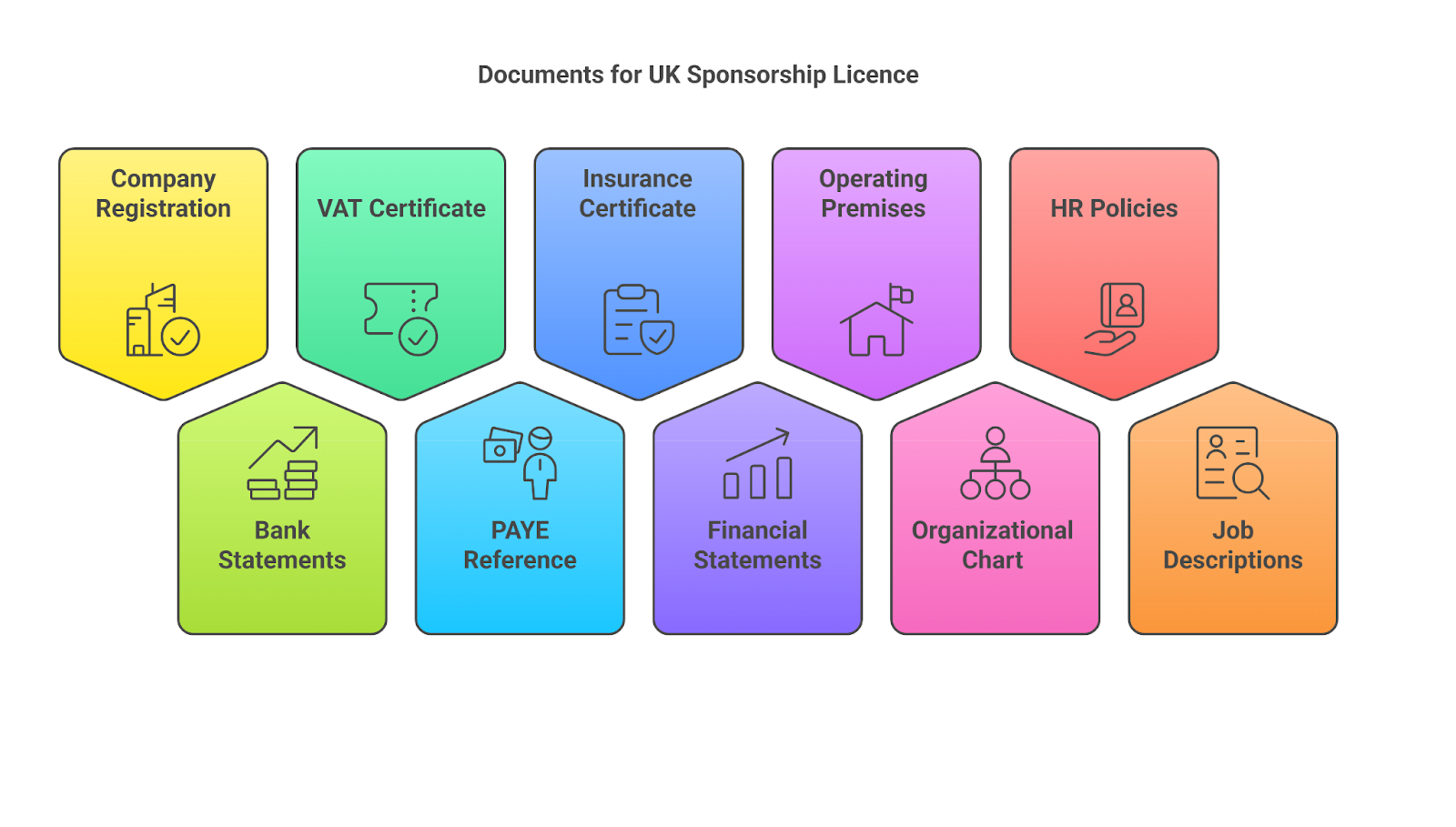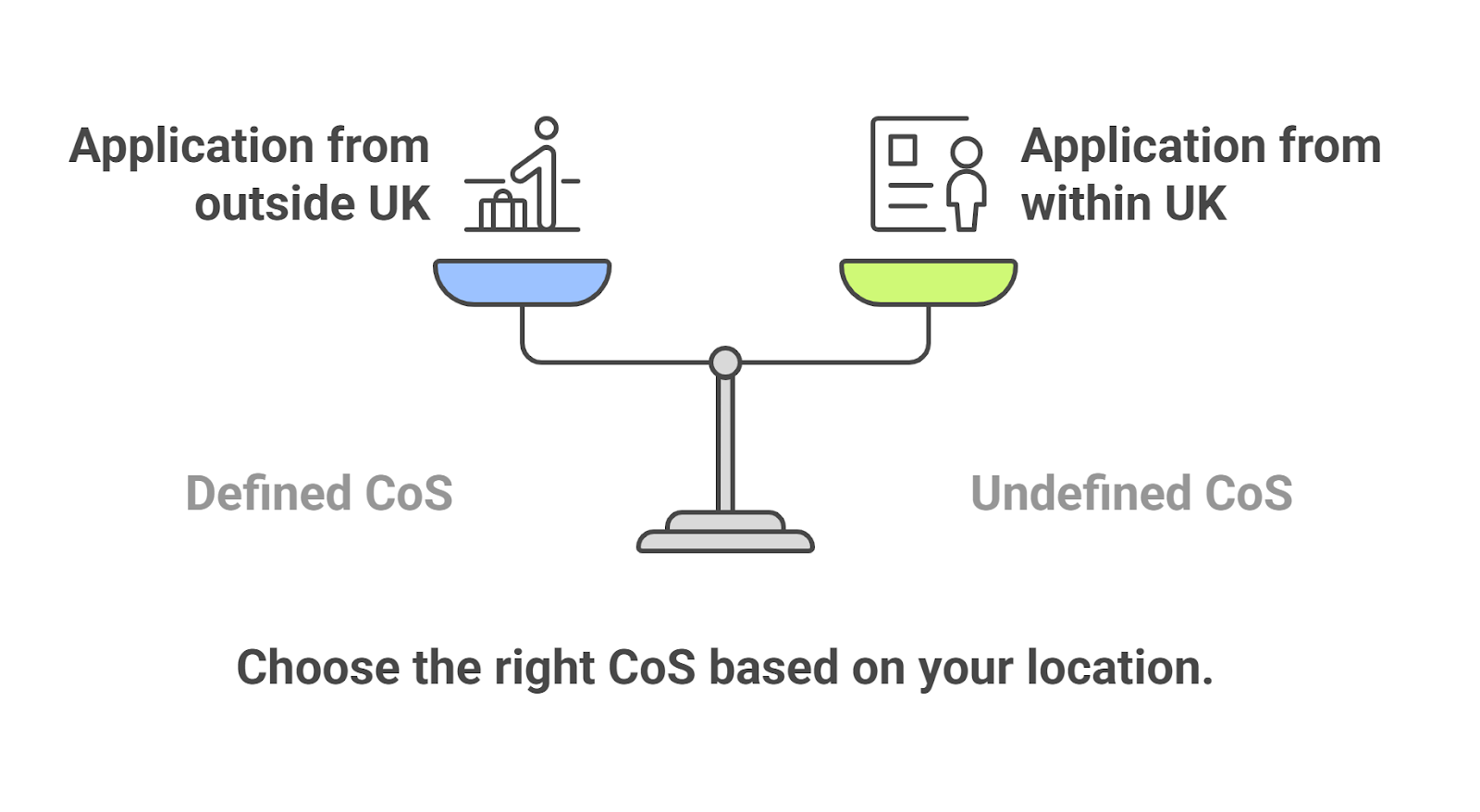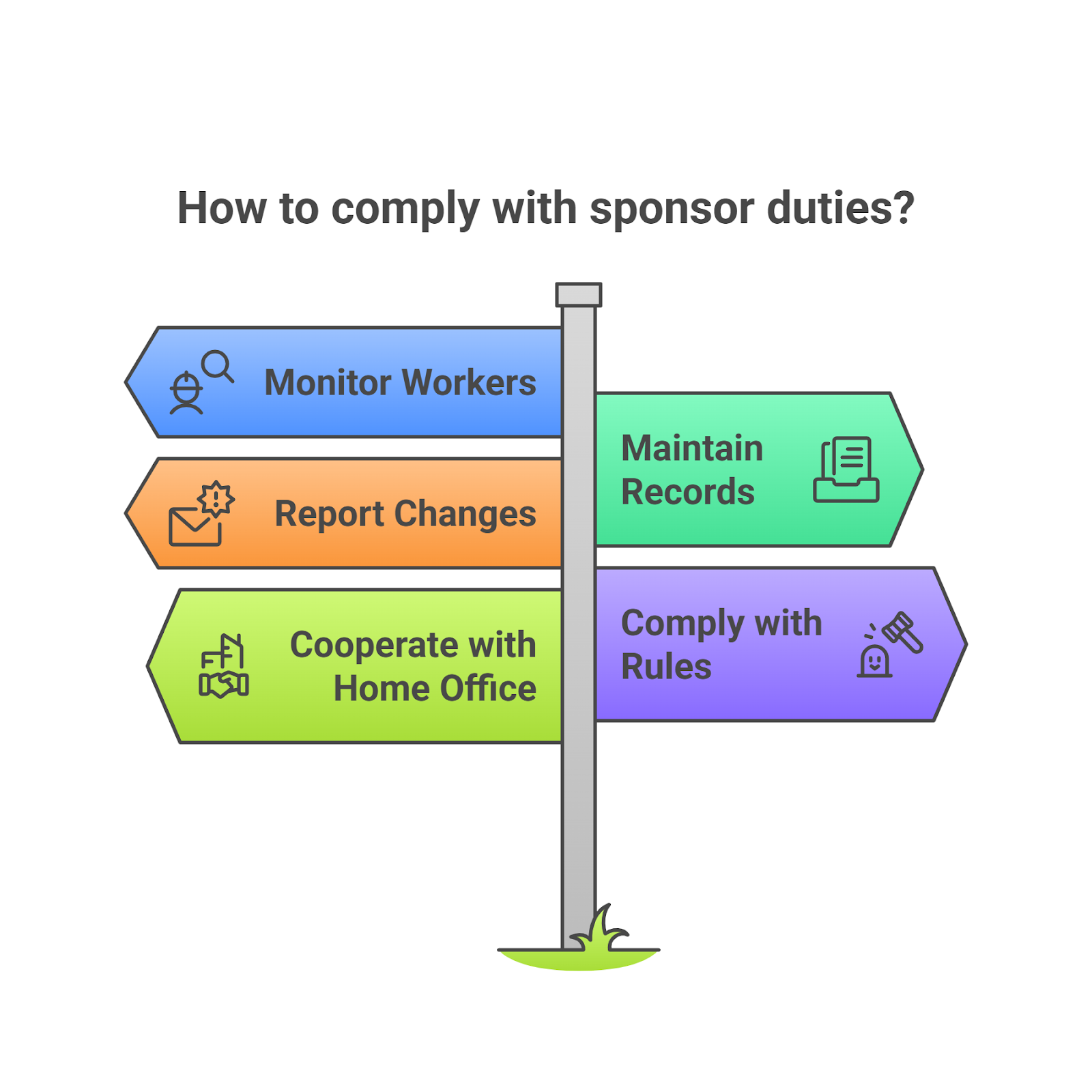In today's globalised economy, UK businesses often need to look beyond national borders to find the talent and skills required for growth and innovation. The UK's visa sponsorship system enables employers to recruit eligible foreign nationals to fill job vacancies. However, navigating the complexities of obtaining and maintaining a Sponsor Licence, assigning Certificates of Sponsorship (CoS), and adhering to compliance obligations can be challenging.
What Is UK Visa Sponsorship?
UK Visa Sponsorship is a system that enables UK-based companies and organisations, licensed by the Home Office, to employ individuals who do not have the right to work in the UK (i.e., they are not British or Irish citizens and do not have Indefinite Leave to Remain or other work-permitting status).
- To sponsor a foreign worker, the employer must:
- Hold a valid Sponsor Licence granted by the Home Office.
- Assign the worker a Certificate of Sponsorship (CoS), which is a unique electronic reference number.
- Ensure the job role meets the required skill level and salary threshold for the relevant visa category.
The sponsored employee then uses the CoS to apply for their UK visa. The primary visa route for skilled workers requiring sponsorship is the Skilled Worker visa.
Why Sponsor Foreign Workers in the UK?
For many UK businesses, sponsoring foreign workers offers significant advantages:
- Addressing Skills Shortages: Accessing a wider pool of talent to fill roles where there is a lack of qualified candidates in the domestic labour market.
- Bringing Specialist Skills: Recruiting individuals with unique expertise or experience not readily available in the UK.
- Enhancing Innovation and Diversity: Introducing new perspectives and fostering a more diverse workforce.
- Supporting Business Growth: Ensuring adequate staffing levels to meet business demands and expansion plans.
Who Needs to Be Sponsored in the UK?
Generally, individuals from outside the UK, Ireland, or the EU (unless they have settled or pre-settled status) need a sponsored work visa to be employed legally. Common sponsored visas include:
- Skilled Worker Visa
- Health and Care Worker Visa
- Global Business Mobility Visa
- Scale-up Worker Visa
Becoming a UK Licensed Sponsor
To lawfully hire skilled foreign workers, UK employers must get themselves licensed sponsors. This involves meeting some requirements set by the Home Office and demonstrating your ability to meet sponsorship responsibilities.
Step 1: Apply for a Sponsor Licence
To sponsor workers, your business must apply for a Sponsor Licence through the Home Office. You’ll need to:
- Prove your business is genuine and operating legally in the UK.
- Show you have appropriate HR systems to manage sponsorship duties.
- Appoint key personnel to manage the sponsorship process (Authorising Officer, Key Contact, Level 1 User).
Step 2: Pay the Relevant Fee
The application fee depends on your business size—small businesses and charities pay a lower fee compared to medium or large organizations. This fee must be paid when submitting the sponsor licence application and is non-refundable.
Types of UK Sponsor Licences
There are two broad licence categories:
- Worker Licence – For Skilled Workers and long-term hires.
- Temporary Worker Licence – For seasonal work, internships, or short-term roles.
You can apply for both if needed.
What Documents Do Employers Need for Visa Sponsorship?
To apply for a sponsor licence and hire foreign workers, employers must provide a range of documents that prove their business is legitimate and compliant. These may include:
- Company registration certificate (e.g., from Companies House) to show the business is legally established.
- Business bank statements to prove financial activity and operational stability.
- VAT registration certificate (if applicable) to demonstrate tax compliance.
- PAYE reference and accounts office reference confirming registration with HMRC to pay employees.
- Employer’s liability insurance certificate to meet legal insurance obligations.
- Latest audited accounts or financial statements as proof of financial health.
- Evidence of operating premises, such as a lease or utility bill, showing you have a physical presence in the UK.
- Organisational chart to outline your company’s structure and reporting lines.
- HR policies and procedures demonstrating your ability to manage sponsored workers.
- Job descriptions and recruitment materials proving the roles are genuine and recruitment efforts were made locally.

Certificate of Sponsorship (CoS) in UK
Once licensed, you can issue a Certificate of Sponsorship to eligible foreign candidates. This is a digital document with a unique reference number used in the visa application.
There are two types:
Defined CoS: For workers applying for a Skilled Worker visa from outside the UK. The employer must apply for a Defined CoS allocation through the Sponsor Management System (SMS).
Undefined CoS: For workers already in the UK who are switching to a different visa category or extending their stay under the Skilled Worker route. Employers with an Undefined CoS allocation can assign these directly through the SMS.

Employer Responsibilities as a Sponsor
- Maintain Records: Keep accurate and up-to-date records for all sponsored employees, including contact details, immigration status, job descriptions, and absences.
- Report Changes: You must report significant changes (e.g., job title, salary, or absences of 10+ days without permission) using the Sponsor Management System (SMS).
- Compliance with UKVI: You must follow all Home Office regulations. Non-compliance can lead to your licence being downgraded, suspended, or revoked.
Understanding Salary Requirements
A critical aspect of sponsoring Skilled Workers is ensuring the salary meets the required threshold. Employers must pay either the general minimum salary or the 'going rate' for the specific occupation code, whichever is higher.
The 'going rate' is based on the 25th percentile of salaries for that occupation code as defined by the Office for National Statistics (ONS). There are specific rules and potential discounts to the salary threshold based on factors such as:
- New Entrants: Workers under the age of 26, those switching from a student visa, or those in their first job after graduation may be eligible for a lower salary threshold.
- Health and Care Worker Visa: Specific (and often lower) salary rules apply to eligible roles in the health and care sector.
- National Pay Scales: Some roles, particularly in the public sector, may adhere to national pay scales that could be below the general threshold but are still acceptable for sponsorship.
It is crucial to accurately determine the correct occupation code and ensure the offered salary meets the specific requirements for that role.
The Immigration Skills Charge (ISC)
The sponsor employers normally need to contribute the Immigration Skills Charge (ISC). The fee is incurred by each sponsored employee every year and is paid to encourage the employers to upskill and train local individuals. It is in line with how much and is differentiated based on the size of the organisation, and whether charitable or not. The charges will be less in small or charities but more with big employers.
There are exemptions to the ISC, including sponsoring:
- PhD-level occupations.
- Workers switching from a Student visa to a Skilled Worker visa.
- Individuals sponsored for a limited period (e.g., less than six months).
Timeframes for Approval of UK Sponsor Licence and Visa Application
Sponsor Licence Approval: Typically takes up to 8 weeks for a decision once the application is submitted. Employers can opt for a priority service (if available) to receive a decision in as little as 10 working days.
Visa Application Processing: For Skilled Worker visa applicants applying from outside the UK, the standard processing time is approximately 3 weeks after attending the visa appointment and submitting biometrics. Delays can occur during peak periods or if additional documentation is required.
Ongoing Sponsor Duties and Compliance
Holding a Sponsor Licence comes with significant responsibilities. Employers must:
- Monitor Sponsored Workers: Ensure they are working in the role specified in their CoS and are complying with the conditions of their visa.
- Maintain Accurate Records: Keep up-to-date records of sponsored employees, including their contact details, right-to-work checks, and immigration status.
- Report Changes to the Home Office: Inform the Home Office of any significant changes, such as a change in the worker's job role, salary, working location, or if they leave your employment. This must be done within specific timeframes.
- Comply with Immigration Rules and Guidance: Stay informed about and adhere to all relevant immigration laws and Home Office guidance.
- Cooperate with the Home Office: Be responsive to any requests for information or audits from the Home Office.

Failure to comply with these duties can lead to serious consequences, including:
- Downgrading of Sponsor Licence Rating: Moving from an "A" rating to a "B" rating, which requires an action plan for improvement.
- Suspension of Sponsor Licence: Temporarily losing the ability to sponsor new workers.
- Revocation of Sponsor Licence: Permanently losing the ability to sponsor foreign workers.
- Civil Penalties: Fines for non-compliance.
Benefits of Becoming a Sponsor in the UK
Becoming a licensed sponsor enables UK employers to hire skilled talent from around the world, filling labour gaps and driving business growth. It also demonstrates a commitment to structured hiring and immigration compliance.
|
Access to a larger global talent pool |
Allows hiring skilled overseas professionals when local talent is limited. |
|
Competitive advantage in skilled industries |
Helps meet workforce needs in high-demand sectors like healthcare, tech, and engineering. |
|
Enhanced reputation as an inclusive employer |
Shows commitment to diversity, boosting brand image and employee morale. |
|
Increased workforce stability |
Sponsored workers are more likely to stay long-term, reducing hiring and training costs. |
|
Support for business expansion |
International hires bring global insights and skills that support business growth abroad. |
Preparing for a Home Office Audit
The Home Office may conduct announced or unannounced audits to ensure sponsors are meeting their obligations. Being prepared for such audits is crucial. This includes:
- Maintaining organised and accessible records.
- Ensuring HR staff are well-trained on sponsorship duties.
- Conducting regular internal audits to identify and address any potential compliance issues.
Key Considerations for UK Employers in 2026
Higher Salary Thresholds: Note the significant increase in the minimum salary threshold for Skilled Workers in 2026. Take this into account in your recruitment and pay planning.
Immigration Skills Charge Fees: Pay the periodic cost of the ISC when sponsoring Skilled Workers.
Compliance is Crucial: Ensure compliance with every sponsor obligation to stay away from fines and retain your licence.
Utilize the Sponsor Management System (SMS): Get to know the SMS because this is the core sponsorship management system.
Seek a Lawyer's Advice: If you are a first-time sponsor or dealing with complex situations, consulting a qualified immigration attorney may be a good idea.
Tips for a Smooth Sponsorship Process
Here are some practical tips that can help employers avoid delays and maintain their sponsor status effectively.
- Keep HR systems well-organized for audits.
- Train staff on sponsor duties and compliance.
- Review your business eligibility before applying.
- Consult immigration professionals if unsure about specific cases.
Frequently Asked Questions
You must apply online through the Home Office portal and submit supporting documents showing your business is genuine and compliant.
You must monitor your sponsored workers, report changes to the Home Office, and maintain accurate HR records to stay compliant.
Your sponsor licence could be downgraded, suspended, or revoked, affecting your ability to hire foreign workers.
It’s a digital reference number issued by the employer to the worker, allowing them to apply for their visa.
No. The job must meet salary and skill requirements set by the government and be listed on the eligible occupations list.
Yes. Sponsor licences are valid for 4 years and must be renewed before expiration to continue sponsoring workers
Yes. If you fail to comply with sponsorship duties, submit false information, or employ people illegally, your licence may be revoked.
Content Disclaimer: While this information was last updated in January 2026, we strongly suggest confirming all travel details with the appropriate governmental agencies, embassies, and airlines.
